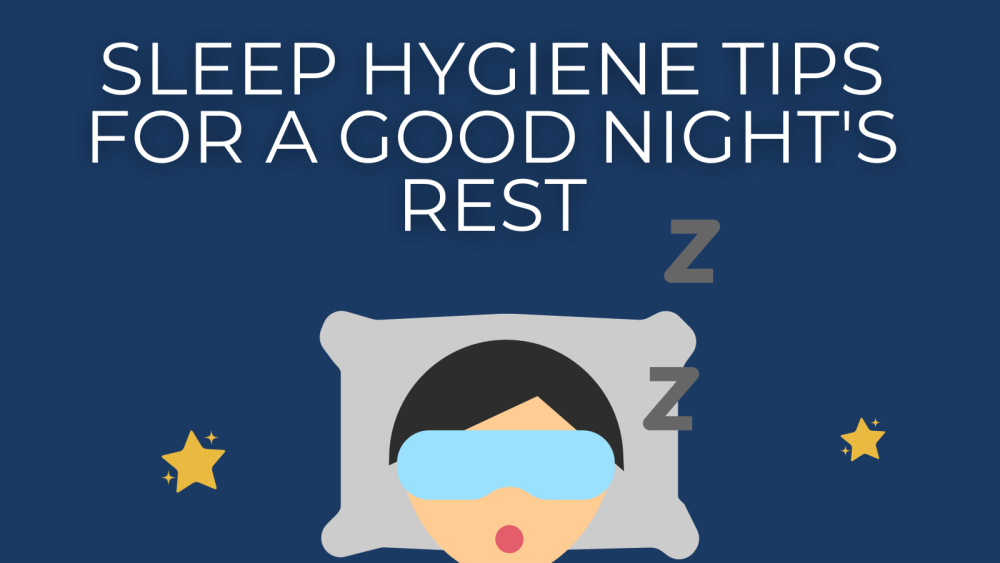Sleep Hygiene Tips for a Good Night's Rest
Posted on
Embarking on a path to better sleep starts with understanding what sleep hygiene truly means. Think of it as the foundation of a restful night.
Good sleep isn't just about shutting your eyes for several hours; it's an essential process where your body repairs and your mind resets.
Embracing proper sleep hygiene is key to enhancing the quality of your sleep, ensuring you wake up revitalised and prepared for your day.

Mastering Sleep Hygiene for Better Rest: Tips for All Ages
Consider sleep hygiene as a collection of practices and habits critical for obtaining restorative sleep and maintaining alertness throughout the day. It's about setting up the right environment and establishing routines that signal to your body that it's time to relax.
Everything counts, from how comfortable your bed is to the ambience in your bedroom. By paying attention to these elements, you can dramatically improve your sleep quality, leading to improved mood, better productivity, and overall health benefits.
Sleep Hygiene For Different Age Groups
Sleep hygiene isn't a one-size-fits-all matter; it needs tailoring to suit different age groups. For children, establishing a bedtime routine is vital. This could include a calming bedtime story or a warm bath. Ensuring their room is a comfortable, quiet, and dark sanctuary aids in promoting uninterrupted sleep.
Teenagers, with their changing bodies and social habits, require a different approach. Encouraging regular sleep times even on weekends helps regulate their body clock. Limiting caffeine and screen time before bed is also beneficial.
For adults, managing stress and maintaining a healthy lifestyle are key. This includes regular exercise but avoiding vigorous workouts close to bedtime. A relaxing pre-sleep routine, like reading or listening to soft music, can greatly improve sleep quality.
Older adults often experience changes in sleep patterns. Creating a restful environment and maintaining a consistent sleep schedule becomes even more important. Small adjustments in your sleep habits can make a substantial difference to your overall health, regardless of your age.
Using Sleep Loss Treatments
Dealing with short-term insomnia often requires careful consideration, especially when it comes to medication. It's important to view medication as a last resort rather than the first line of defence. Before heading down this path, take a moment to evaluate your daily routines and sleeping environment.
Are you sticking to a regular sleep schedule? Have you made your bedroom a tranquil space? Perhaps you've tried some relaxation techniques like mindfulness or gentle yoga?
If these strategies aren’t helping and your sleepless nights are taking a toll on your daily activities, it may be time to seek advice from a healthcare professional. They can assess whether a short-term medication might be suitable for your specific situation. Chemist4U can help you find the right treatment for the good night's sleep you're craving after an online consultation you can buy sleeping tablets and they will send your prescription to your home.
It’s essential to remember that such medications are typically intended for temporary use. Relying on them long-term can lead to dependency and might not tackle the root cause of your sleep disturbances.
Ultimately, the aim is to cultivate healthy sleeping habits and address any lifestyle elements that might be impacting your sleep. Medication can offer a temporary fix, but achieving a natural, restful sleep pattern is the ultimate goal.
Creating An Environment For Sleep
Transforming your bedroom into a restful haven is a key aspect of sleep hygiene. Your bedroom should be a sanctuary, exclusively for sleep and relaxation. Start by focusing on the comfort of your bed.
A supportive mattress and pillows tailored to your sleeping position can make a significant difference. Consider the texture and warmth of your bedding as well; it should help you feel comfortable throughout the night.
The ambience of your room also plays a vital role. A cool, dark, and quiet environment is ideal for sleep. You might want to use blackout curtains to block any external light and ensure the temperature is comfortably cool.
If noise is an issue, consider soft earplugs or a white noise machine to create a soothing background sound.
Keep your bedroom free from distractions too. This means removing work materials, electronics, and clutter. By creating a space that feels calm and orderly, you're setting the stage for a peaceful night's sleep. Remember, your bedroom's setup can greatly influence the quality of your rest.
Mastering sleep hygiene is about tailoring your nighttime routine and environment to fit your unique needs. From the comfort of your bed to the consistency of your sleep schedule, each aspect plays a crucial role in ensuring you enjoy restorative sleep. Remember, your bedroom should be a sanctuary for rest, free from distractions and conducive to relaxation. Managing screen time, diet, exercise, and stress levels are all integral parts of this puzzle.
Final thoughts
Your approach to sleep hygiene will vary depending on your age and lifestyle, but the goal remains the same: a good night's sleep. By implementing the tips discussed, you’re not just improving your nights; you’re enhancing your days too. Sleep well, live well, and remember, that a restful night is within your reach.
